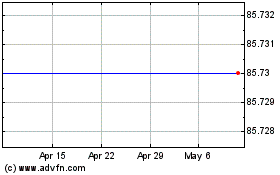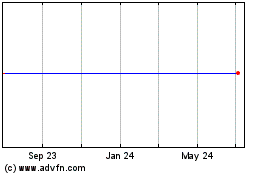Pharma M&A Surge Spurred By Necessity And Opportunity
April 27 2012 - 10:54AM
Dow Jones News
The sudden willingness of European drug companies to launch
hostile takeover bids -- underscored by numerous bids this month --
underlines the depth of the sector's problems and its need to find
new products, while also tapping into emerging markets for
growth.
It also highlights the advanced stage of many biotech pipelines
which give M&A propositions more certainty, at least in theory,
analysts say.
"The asset values of many biotech companies have become more
visible and therefore look more secure, so a pharmaceutical company
can look at those late-stage assets and say, 'Okay, I can put a
value on that'", Panmure analyst Savvas Neophytou said.
In the past, drug companies wanting exposure to cutting-edge
therapies had to take nearly blind bets on what a prospective
medicine's asset value was just to get involved in a particular hot
technology.
"Now, because a lot of biotechs have late-stage assets,
prospective buyers are able to be a little bit more specific and
more secure in the valuation that they are willing to attribute,"
Neophytou said.
As a result, companies like GlaxoSmithKline PLC (GSK) and
AstraZeneca PLC (AZN) of the U.K. have stepped up their drive to
acquire smaller biotechnology companies with promising new drugs to
improve their pipelines of high-priced patented medicines.
Confidence can also be enhanced when companies have a good
understanding of what target companies can offer, as is the case
with Glaxo, which has made a $2.6 billion hostile bid for long-time
business partner Human Genome Sciences Inc. (HGSI), although its
$13 a share offer was rejected by the U.S. firm as inadequate.
"We are the compelling owner for this business [HGSI] as we have
the rights to and control of the company's three main assets
including the only one so far launched, Benlysta [for lupus],"
Glaxo Chief Executive Andrew Witty said. "We believe this is the
right time to maximize value for both sets of shareholders."
The urgency do deals varies from company to company.
Some drug makers, like AstraZeneca, have huge holes to fill in
their product pipelines caused by patent expiries on their
top-selling medicines and lackluster innovation records.
AstraZeneca joined the fray Monday by announcing it will buy
U.S.-based Ardea Biosciences (RDEA) for $1.26 billion, a deal that
will expand the troubled British drug maker's thin pipeline of new
medicines. Ardea's clinically most advanced candidate medicine,
lesinurad, is currently in late-stage trials as a pill for treating
the buildup of uric acid in patients with gout. Filings for market
authorization in the U.S. and Europe are planned in the first half
of 2014. AstraZeneca said it also plans to develop and
commercialize lesinurad in China and Japan.
The lure of emerging markets and promises of strong growth there
for medicines is also acting as an M&A catalyst, as underscored
this week by U.S. biotech company Amgen's deal to buy Turkey's
Mustafa Nevzat Pharmaceuticals, a maker of injectable generic
drugs, for around $700 million.
The explosive growth projected for generic versions of branded
drugs that have or will come off patent protection is another key
driver for acquisitions and lay behind Wednesday's transaction
whereby Watson Pharmaceuticals Inc. (WPI) agreed to buy Swiss rival
Actavis in a widely expected deal valued at $5.9 billion.
The deal elevates the U.S.-based group to No. 3 in the global
rankings of generic drug makers.
Angus Russell, Chief Executive of Shire PLC (SHP.LN), a
specialist in hyperactivity and rare genetic diseases and Britain's
third-largest pharmaceutical company, said small, targeted
acquisitions are a sign of the times and a strategy his company has
long practiced.
"Others started the other way around. Many of the pharmaceutical
companies started producing everything in-house out of their own
R&D organizations and over time they've failed to produce
enough that way. So the industry is now coalescing around a 50-50
model of half on your own and half bought in. There are some things
we'll do for ourselves but we need to be constantly on the lookout
for new technologies."
The never-ending search for cutting-edge science is only going
to intensify, as benefits from gene sequencing lead to a new era of
personalized medicine, yielding new approaches to treating cancers
and other serious diseases.
That "Holy Grail" lies behind Roche's failed $6.8 billion bid
for the San Diego-based maker of DNA decoding machines Illumina
(ILMN). But Roche has said there are other fish in the sea, and
that it's determined to find a suitable acquisition around which to
build its diagnostics platform for use in developing targeted
medicines.
Application of this science promises to generate a new world of
medicines.
Investors may look back at today as a watershed of change -- and
value -- for the pharmaceuticals sector.
"Targeted therapies are just around the corner," said Panmure's
Neophytou.
"A lot of pharmaceutical companies are not reflecting much of
the underlying value contained in their pipelines but that's on the
cusp of changing.
"And if we look at the pharmaceutical sector in ten years time
people will look back at today and say, "well, that was obviously
the wrong way to look at it, because we weren't valuing
pipelines."
-By Sten Stovall, Dow Jones Newswires; +44 207 842 9292;
sten.stovall@dowjones.com
Watson (NYSE:WPI)
Historical Stock Chart
From Mar 2024 to Apr 2024

Watson (NYSE:WPI)
Historical Stock Chart
From Apr 2023 to Apr 2024
